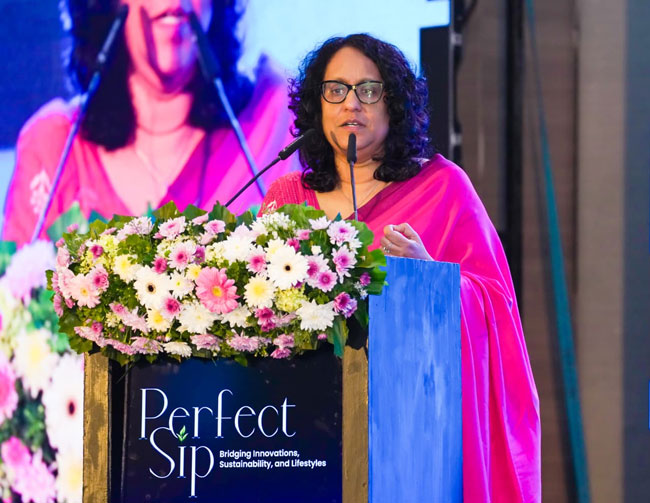November 11, Colombo (LNW): Prime Minister Dr Harini Amarasuriya reaffirmed her government’s commitment to improving the livelihoods of Sri Lanka’s plantation community, describing the proposed wage increase for estate workers as a first step towards ensuring fairer pay and better living standards for those who sustain the country’s tea industry.
Addressing the inauguration of the International Tea Symposium 2025 (InTSym100) in Colombo, Dr Amarasuriya highlighted the government’s decision to raise the daily wage of plantation workers from Rs. 1,350 to Rs. 1,750 from January 2026. The increase includes a base wage of Rs. 1,550 and an additional Rs. 200 attendance incentive.
The event, organised by the Tea Research Institute of Sri Lanka (TRISL) to commemorate its centenary, brought together leading scientists, researchers, policymakers, and industry experts under the theme “Perfect Sip: Bridging Innovations, Sustainability and Lifestyles.” A new tea variety, TRI 5000, was also unveiled and presented to the Prime Minister during the ceremony.
In her address, Dr Amarasuriya emphasised that tea continues to be one of the cornerstones of Sri Lanka’s economy, accounting for nearly 10% of agricultural exports and providing livelihoods to around two million people. She underscored the government’s ambition to boost annual tea production to 400 million kilogrammes and achieve export earnings of US$2.5 billion by 2030.
“Tea is more than an export commodity; it is part of our identity and our heritage. From smallholders to estate workers, every person in the value chain contributes to our global reputation,” she stated.
The Prime Minister paid particular tribute to the women who form the backbone of the plantation sector, making up more than 60% of its workforce. She acknowledged their continued efforts through difficult conditions — from long hours and exposure to occupational hazards to limited access to adequate housing and childcare facilities — and pledged to address these longstanding issues.
Dr Amarasuriya further noted that the government had recently taken steps to grant property ownership to plantation families, with 2,000 housing deeds distributed to long-serving workers earlier this year.
“Our focus is not only on productivity and export growth but also on dignity, equality, and the wellbeing of those who power this great industry,” she said, stressing that the government’s broader goal is to transform the tea sector into a sustainable, inclusive, and globally competitive enterprise.
The ceremony was attended by Minister of Plantation and Community Infrastructure Samantha Vidyarathne, Deputy Minister Sundaralingam Pradeep, Ministry Secretary Prabath Chandrakeerthi, and several representatives from the international tea community.
